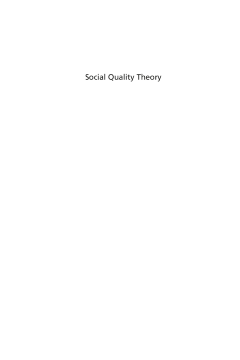
Additional Information
Book Details
Abstract
Social quality thinking emerged from a critique of one-sided policies by breaking through the limitations previously set by purely economistic paradigms. By tracing its expansion and presenting different aspects of social quality theory, this volume provides an overview of a more nuanced approach, which assesses societal progress and introduces proposals that are relevant for policy making. Crucially, important components emerge with research by scholars from Asia, particularly China, eastern Europe, and other regions beyond western Europe, the theory’s place of origin. As this volume shows, this rich diversity of approaches and their cross-national comparisons reveal the increasingly important role of social quality theory for informing political debates on development and sustainability.
Ka Lin is Docent at the University of Tampere, Senior Researcher and Docent at the University of Turku, Professor and Director of the Social Policy Research Center at Nanjing University, Professor and Executive Director of the MSW Center of Zhejiang University, and Deputy Director of the Center for European Studies at Zhejiang University. He is also Vice President of the International Association on Social Quality and Editor of the International Journal of Social Quality.
Peter Herrmann is Adjunct Professor in the Department of Social Sciences at the University of Eastern Finland, Honorary Associate Professor in the Department of World Economy at Corvinus University of Budapest, correspondent to the Max Planck Institute for Social Law and Social Policy, Munich, Associate Member of the Eurasian Center for Big History and System Forecasting, and Member of the Scientific Committee of Eurispes. Currently he lives and works in Rome.
